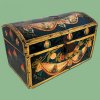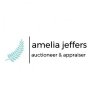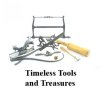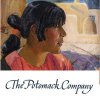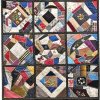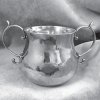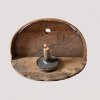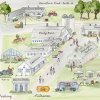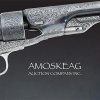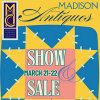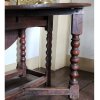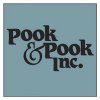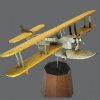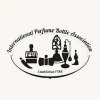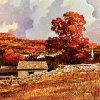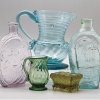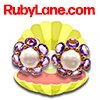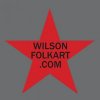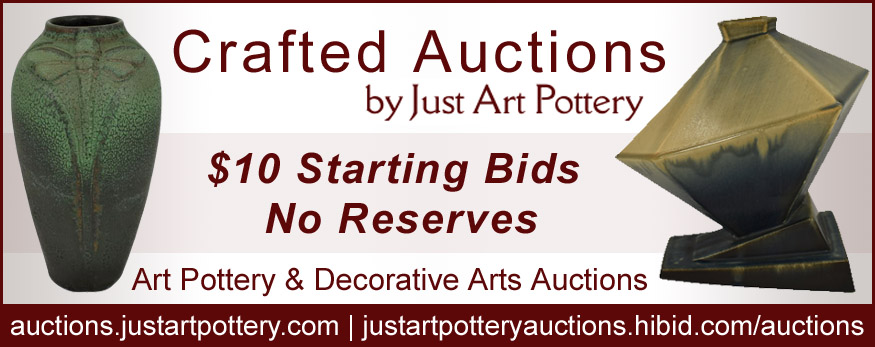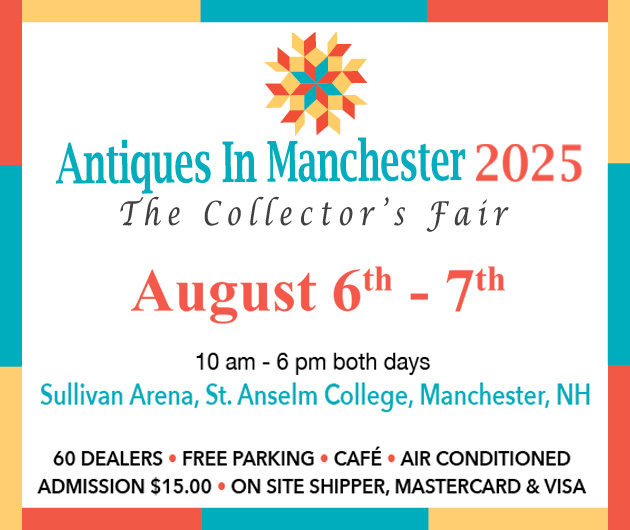The 2016 National APIC Convention
July 10th, 2016
Harrisburg, Pennsylvania
The 2016 national convention for the American Political Items Collectors (APIC) was held from July 6 to July 10 at the Harrisburg Hilton Hotel in Harrisburg, Pennsylvania.
The APIC holds its national convention every two years. “Usually in election years our membership goes up a few hundred,” remarked president Ron Puechner. The organization has about 1600 members and is made up of regional and specialty chapters. This convention was put together by cochairs Scott Mussell and Ted Hake. A keystone sponsor, Hake’s Americana & Collectibles, based in York, Pennsylvania, was founded in 1967 and holds online auctions.
In conjunction with the Mason Dixon chapter, Mussell and Hake put on a well-run and well-attended event, which was a large-scale effort. Ted Hake is a legend in the field of political memorabilia and has a wealth of information on numerous sectors within the hobby. Hake was given a lifetime achievement award during the convention’s banquet on July 9.
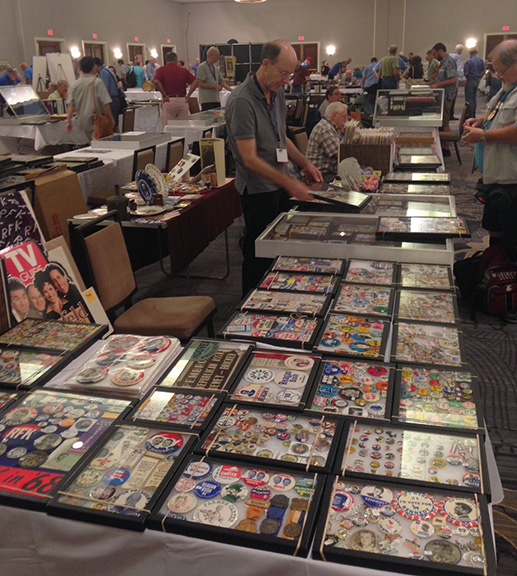
Over 200 tables were set up in the ballroom for exhibitors, who offered material for sale from all political eras.
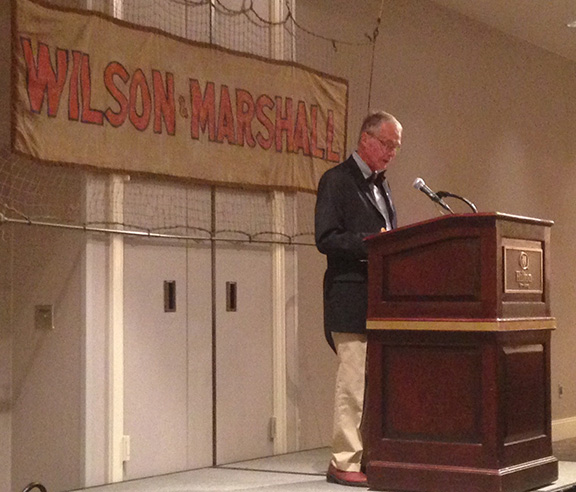
Dr. John Milton Cooper Jr. gave the keynote lecture on the subject of the 1916 presidential election, which was narrowly won by Woodrow Wilson over Charles Hughes.
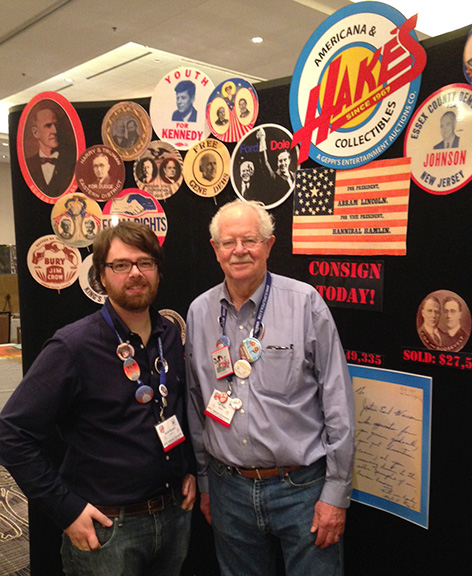
Convention cochairs Scott Mussell (left) and Ted Hake helped put on an excellent educational event. Hake’s Americana & Collectibles, York, Pennsylvania, was the keystone sponsor.
Many club-sponsored events were held. Around 40 members displayed items from their collections in an excellent exhibit on the third floor. Items were not for sale and covered all eras of American political history. These displays were a popular component of the convention.
Various seminars and programs took place, and members took part in many area field trips. Gettysburg is about a 45-minute drive southwest, and Lancaster is one hour southeast. Tours were taken to the Gettysburg battlefield and museum and also Eisenhower’s farm. Wheatland was James Buchanan’s house in Lancaster. Buchanan was the 15th U.S. president. The state capitol building is a few blocks from the Hilton, and members received deluxe tours. Hershey is about 20 minutes east, and some explored the Hershey auto museum and Hersheypark in their free time.
In the evenings, members took part in riverboat cruises and baseball games on City Island (all within a short walk). The Harrisburg Senators are the Washington Nationals AA affiliate.
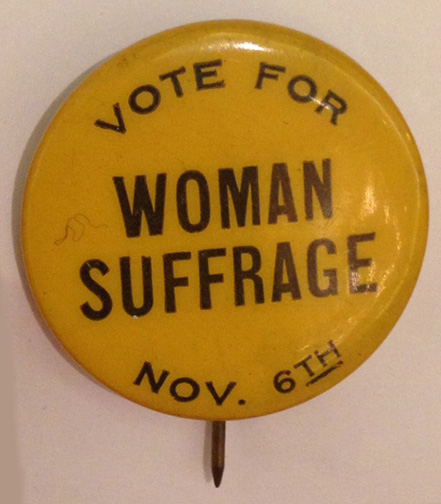
A “Vote for Woman Suffrage” pin was priced at $750 by Stephen Mihaly.
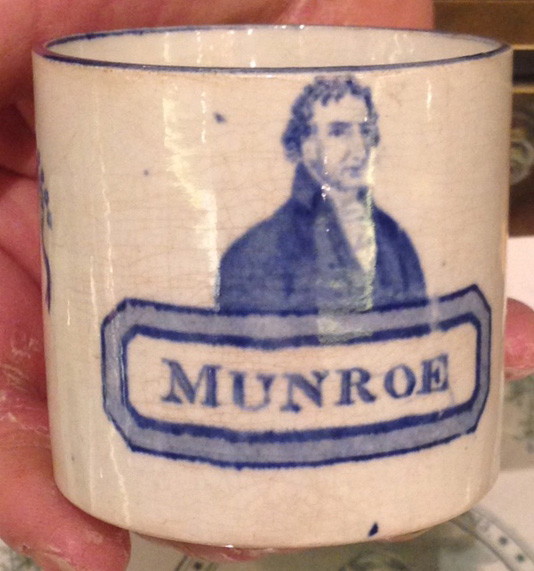
This rare “MUNROE” circa 1820 child’s cup was priced at $22,500 by Rex Stark.
Another local site open to convention attendees was the Zion Lutheran Church, located two blocks from the Hilton. It was the site of the 1839 Whig Convention, which was when William Henry Harrison and John Tyler were nominated for president and vice president. Showcases in the church display material from the convention. Harrison went on to beat sitting President Martin Van Buren in the 1840 election. Although he was from a wealthy family, military hero Harrison ran a campaign depicting himself as a common citizen. The “Hard Cider” and “Log Cabin” candidate easily won over Van Buren as the country was in an economic depression.
The convention schedule was loaded with events. Dr. John Milton Cooper Jr. gave the keynote lecture the evening of July 7. Cooper is an author, historian, and retired professor, and his most recent book is a biography titled Woodrow Wilson. It was a Pulitzer Prize finalist. The author is recognized as the country’s foremost scholar of President Wilson. Cooper taught at the University of Wisconsin-Madison, where much of his work centered on the Progressive Era.
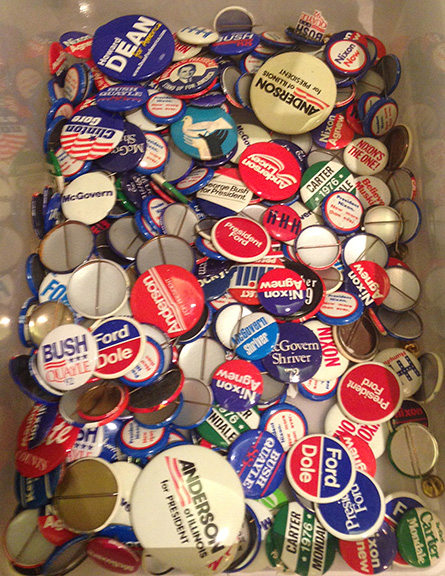
There is no economic barrier to enter the hobby, and shows/conventions such as this serve as excellent entry points. The APIC convention is just one such educational opportunity for all people from all parties and areas of interest to start collecting or add to existing collections. These pins were 25¢ each from Stephen Mihaly.
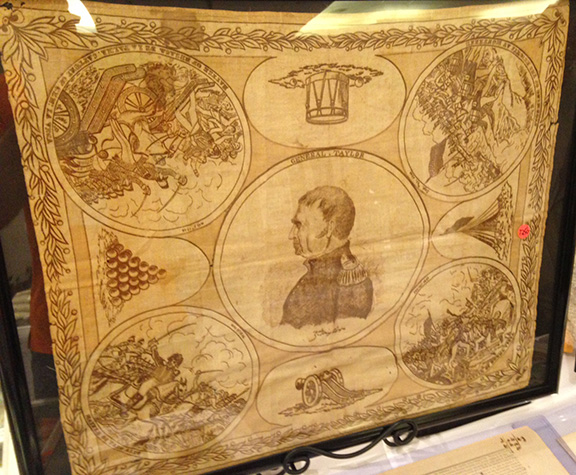
This 1848 Zachary Taylor printed handkerchief was priced at $7250 by Massachusetts dealer Rex Stark.
It was fitting, given the timing, that Cooper’s speech regarding the 1916 presidential election came on its 100th anniversary. APIC club member and Princeton classmate Tony Atkiss introduced Cooper. The 1916 election was one of the closest in history, with an electoral map similiar to the 2000 election (another one of the closest), Cooper explained. California was the hinge state during the former election, and Florida for the latter.
Both the Republicans and Progressives held their 1916 conventions in Chicago. The two parties were unable to unite, and Republican party leaders would not nominate Theodore Roosevelt. The Progressive party stood by Roosevelt. Supreme Court justice and former New York Governor Charles Hughes became the frontrunner and eventually received the nomination. The 1916 Democratic convention was held in St. Louis, and both Wilson and Hughes had great concern about keeping the country out of European warfare. Various parallels ran between both party platforms. On election night, numerous newspapers reported Hughes as the winner. Election figures from the West (in particular, California) took several days to be tallied, and Wilson ended up carrying the state by a narrow margin.
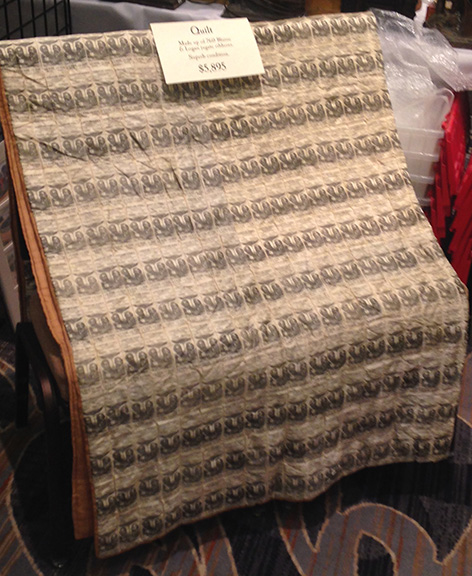
This circa 1884 quilt is made up of 760 Blaine and Logan jugate ribbons from their 1884 campaign (they lost to Cleveland and Hendricks). It was priced at $5895 by Tom French.
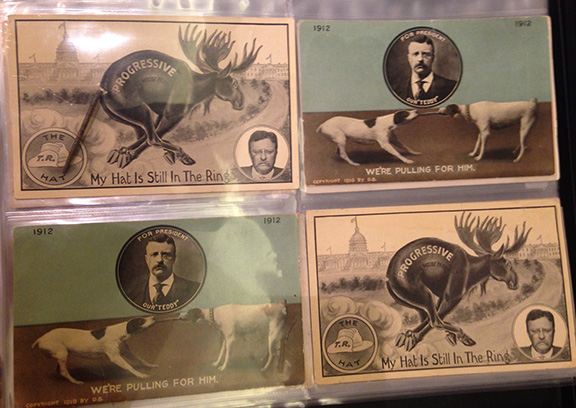
These four Teddy Roosevelt postcards were $250 (upper left), $85 (upper right), $175 (lower right), and $60 (lower left). They were offered by Ron Puechner. Puechner is a collector from Arizona and the current APIC president.
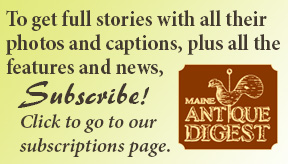 The member trade show (bourse) was in the Harrisburg ballroom and overflowed into the atrium. It opened on July 8 and ran until July 10. A worthwhile component to the buy, sell, and trade event was free admission to the public and free use of the nearby parking garage on Saturday and Sunday. “This is one of the first times we [APIC] have done this [free admission and parking] at the national convention,” said Puechner. “We tried it in Denver in 2014 because a big focus is public access.” The show was a great opportunity for the public to get introduced to American political history, regional history, and political memorabilia. Where else would someone get the chance to see thousands and thousands of political items from all eras—jugates, buttons, pinbacks, ribbons, posters, photographs, postcards, and more? A jugate consists of two portraits, often side by side, and often done for early campaign pinbacks.
The member trade show (bourse) was in the Harrisburg ballroom and overflowed into the atrium. It opened on July 8 and ran until July 10. A worthwhile component to the buy, sell, and trade event was free admission to the public and free use of the nearby parking garage on Saturday and Sunday. “This is one of the first times we [APIC] have done this [free admission and parking] at the national convention,” said Puechner. “We tried it in Denver in 2014 because a big focus is public access.” The show was a great opportunity for the public to get introduced to American political history, regional history, and political memorabilia. Where else would someone get the chance to see thousands and thousands of political items from all eras—jugates, buttons, pinbacks, ribbons, posters, photographs, postcards, and more? A jugate consists of two portraits, often side by side, and often done for early campaign pinbacks.
An auction of items consigned by members was held on the evening of July 8. It was open to the public.
The location for the 2018 national convention has not been set. “Two possibilities we are looking at are either Tennessee or Alabama,” said Puechner.
To learn more, visit the website (www.apic.us).
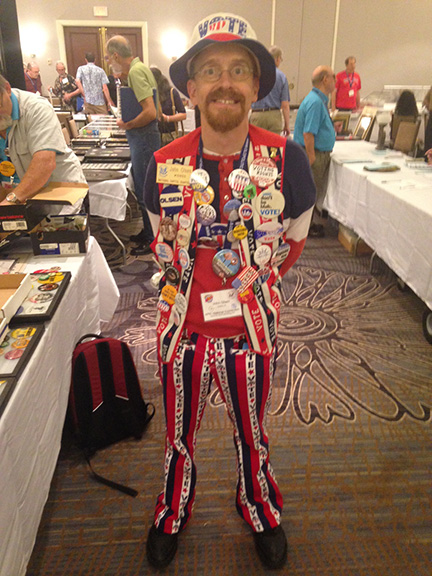
John Olsen is known within the trade as Dr. Vote. “I collect nonpartisan ‘get out the vote’ material,” said Olsen. The niche category is a growing field, according to Olsen. “I’m getting much more competition than I used to.”
Members' Display
Around 40 members displayed items from their collections in an excellent exhibit on the third floor. Items were not for sale and covered all eras of American political history.
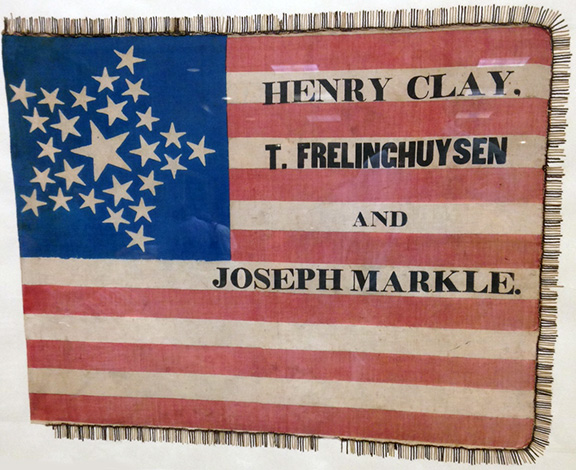
Kim Gelke showed this Henry Clay campaign flag from the 1844 election.
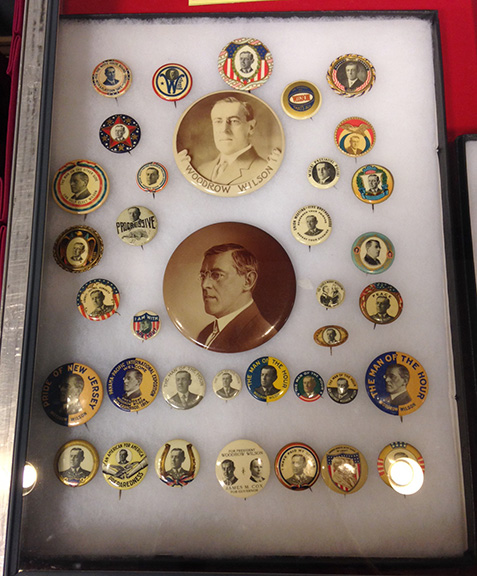
Tony Atkiss began collecting in 1952. He owns the preeminent collection of Woodrow Wilson material, as partially seen here.
Originally published in the September 2016 issue of Maine Antique Digest. © 2016 Maine Antique Digest


